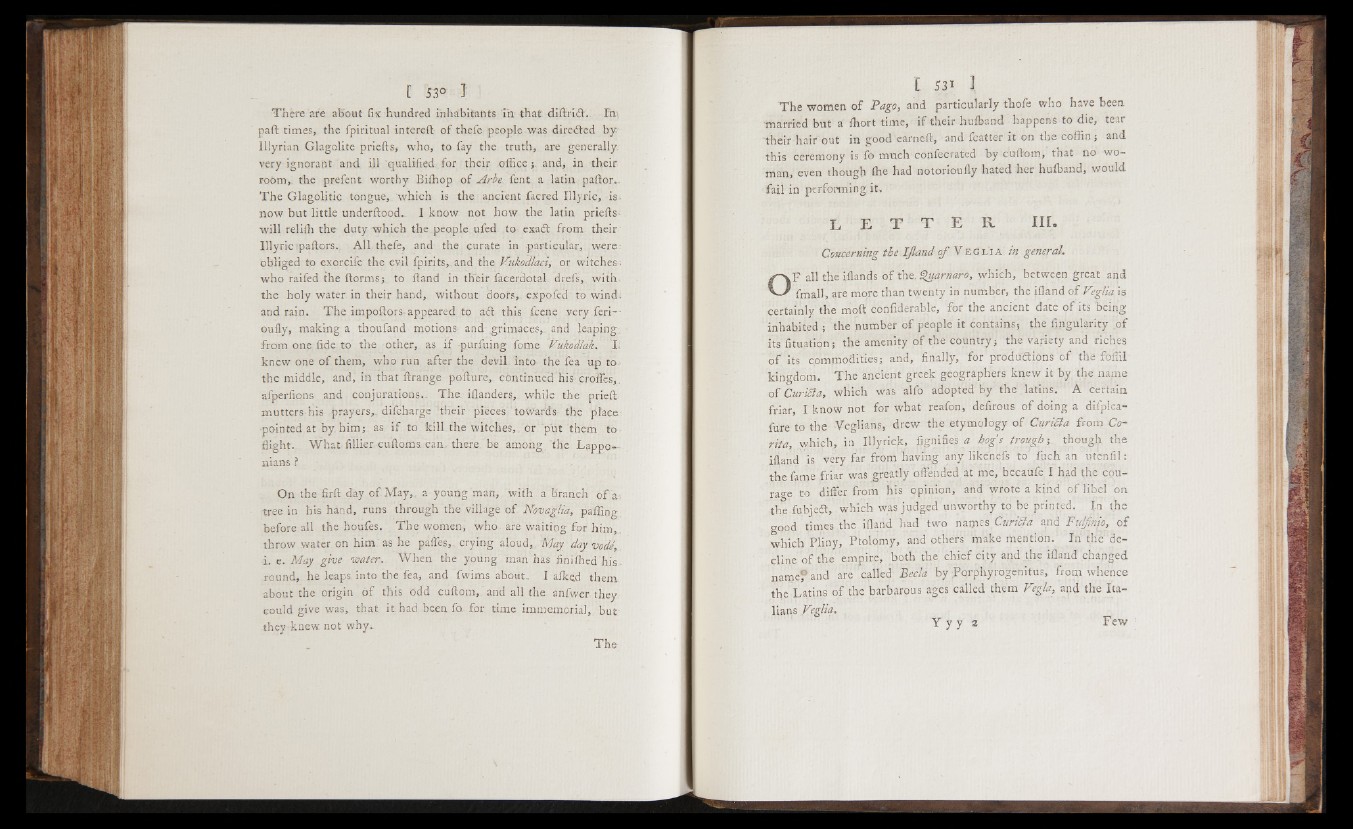
Thère are about fix hundred inhabitants in that diftrict. In
paft times, the fpiritual intereft of thefe people was directed by.
Illyrian Glagolite priefts, who, to fay the truth, are generally
very ignorant and ill qualified for their office;, and, in their
room,, the prefent worthy Biffiop of Arbe fent a latin pallor..
The Glagolitic tongue, which is the ancient facred Illyric, is.
now but little underftood. I know not how the latin priefts-
will reliffi the duty which the people ufed to. exadl from their
Illyric pallors. A ll thefe, and the curate in particular, were,
obliged to exorcife the evil fpirits,, and the Vukodlaci, or witches;
who raifed the ftorms; to Hand in their facerdotal. drefs, with,
the holy water in their hand, without doors,, expofed to wind,
and rain. The impoftors-appeared to aft this fcene very feri-
oully, making a thoufand motions; and grimaces,-and leaping;
from one fide to the -other,, as if -purfuing fome Vukodlak. I
knew one o f them, who run after the devil into the fea up to
the middle, and, in that ilrange pofture, continued his croffes,
afperfions and conjurations.. The iflanders, while the prieft
mutters his prayers,, difcharge'their pièces towards the place.;
■pointed at by him; as i f to kill the witches,, or put them to
flight. What fillier cuftoms. can. there, be among . 'the Lappo.--
nians ?
On the firft day o f May,, a young man, with a Branch o f a*
tree in his hand, runs through the village o f Novaglia, palling
before all the houfes. The women, who. are waiting for him,,
throw water on him as he palles, crying aloud,. ’H/lay day vodé,
î. e. May give water. When the young man has finiffiedhis.
round, he leaps into the fea, and fwims about, I alked them
about the origin of this odd cuftom,. and all the anfwer they
could give was, that it had been fo. for time immemorial, but
they, knew; not why.
T he
The women o f Pago, and particularly thofe who have been
married but a fhort time, i f their huiband happens to die, tear
their hair out in good earned, and icatter it on the coffin; and
this ceremony is fo much confecrated by cuftom, that no woman,
even though ffie had notorioufly hated her huiband, would
fail in performing it,
L E T T E R I I I .
Concerning the IJland a f V e g l i a in general.
OF all the iflands o f the. £>uarnaro, which, between great and
finall, are more than twenty in number, the jfland of Veglia is
certainly the molt confiderable, for the ancient date o f its being
inhabited ; the number o f people it contains; the Angularity o f
its fituation; the amenity o f the country ; the variety and riches
o f its commodities; and, finally, for productions o f the foffil
kingdom. The ancient greek geographers knew it by the name
of CuriBa, which was alfo adopted by the .latins. A certain
friar, I know not for what reafon, delirous o f doing a dilplea-
fure to the Veglians, drew the etymology o f CuriBa from Co*
rita, which, in Illyrick, fignifie.s a hogs trough-, though the
iiland is very far from having any like'nefs to' fuch an utenfil:
the fame friar was greatly offended at me, becaufe I had the courage
to differ from his opinion, and wrote a kind o f libel on
the fubjeit, which was judged unworthy to be printed. In the
good times the iiland had two names Curicl a and Fulfill jo, o f
which Pliny, Ptoiomy, and others make mention. In the decline
of the empire, both the chief city and the iiland changed
name? and are called Becla by Porphyrogenitus, frorn whence
the Latins o f the barbarous ages called them Vegla, and the Italians
Veglia. ,
Y y y z Few